Zigeunerweisen Blu-ray Movie
HomeZigeunerweisen Blu-ray Movie 
Blu-ray + DVD + Digital CopyArrow | 1980 | 144 min | Not rated | No Release Date
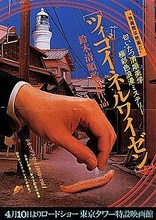
Price
Movie rating
6.8 | / 10 |
Blu-ray rating
| Users | 0.0 | |
| Reviewer | 4.0 | |
| Overall | 4.0 |
Overview
Zigeunerweisen (1980)
In a seaside village of Japan during the 1920s, married professor Aochi (Toshiya Fujita) meets up with old friend Nakasono (Yoshio Harada), who's now a drifter accused of murder. Aochi manages to fight off the suspicion surrounding his buddy, but complications arise when they meet bereaved geisha Koine (Naoko Otani). Nakasono is immediately smitten. Aochi is attracted, but wants to stay faithful to his wife. Yet, over time, the mind games between all three escalate in a violently sexual way.
Starring: Yoshio Harada, Toshiya Fujita, Michiyo Yasuda, Kirin Kiki, Akaji MaroDirector: Seijun Suzuki
| Foreign | Uncertain |
| Horror | Uncertain |
| Mystery | Uncertain |
Specifications
Video
Video codec: MPEG-4 AVC
Video resolution: 1080p
Aspect ratio: 1.34:1
Original aspect ratio: 1.37:1
Audio
Japanese: LPCM 2.0
Subtitles
English
Discs
Blu-ray Disc
Two-disc set (1 BD, 1 DVD)
Digital copy
DVD copy
Playback
Region A (B, C untested)
Review
Rating summary
| Movie | 4.0 | |
| Video | 4.0 | |
| Audio | 4.0 | |
| Extras | 1.5 | |
| Overall | 4.0 |
Zigeunerweisen Blu-ray Movie Review
Reviewed by Jeffrey Kauffman August 18, 2017Note: This film is available as part of
Seijun Suzuki's The Taisho Trilogy.
Have you ever had a dream where something significant within it changed, and yet the dream and its internal logic seemed to continue unabated?
I’ve had dreams were either I or someone else in the dream changed into someone else, and yet it was always clear who was whom and what was
going on (again within the generally incomprehensible context of some of my dreams). I’m sure many of you have had a similar experience,
maybe where a location in a dream suddenly morphs into someplace else, with no real concern resulting as far as the dreamer’s understanding
goes. If you’re one of those rare people who have never had anything like these experiences, I need only suggest you spend a few minutes with
Seijun Suzuki’s The Taishō Trilogy to get at least a hint of the feeling that ensues when a dream bizarrely transforms and yet just as
bizarrely remains an organic whole unto itself. Suzuki had forged a long if not especially notable career churning out B movies for Nikkatsu,
though his nascent auteur tendencies made him a bit of a persona non grata, ultimately leading to his firing (more or less, anyway) after
Branded to Kill pushed the conservative studio bigwigs too far. A
lawsuit
and then ten years of more or less exile followed for Suzuki, but when he returned with The Taishō Trilogy, it was with those previously
dismissed surreal tendencies not only intact, but arguably reinforced by his trek in the cinematic wilderness. The Taishō Trilogy takes its
name from the Taishō Period in Japanese history, an era which stretched roughly from 1912 to 1926, though all three films in this set,
Zigeunerweisen (1980), Kagero-za (1981) and Yumeji (1991), are so intentionally mythic or at least folkloristic that they
often seemed to be divorced from any specific timeframe — much as with many dreams. Also as with the type of dreams referenced above, all
three films waft in and out of general narrative coherence, with striking shifts in perspective and odd visual and verbal non sequiturs that may
speak directly to the subconscious but which (perhaps unavoidably) present certain obstacles to the rational mind.
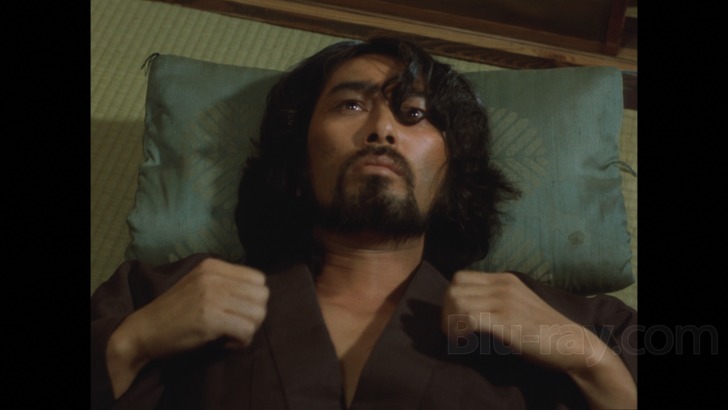
It might strike some as more than a bit odd that a Japanese film so squarely set in an identifiable historical epoch as this one is should bear a German sounding title, and in fact that oddity only increases when one realizes that Zigeunerweisen translates as Gypsy Airs and refers to a famous violin composition which was made famous by its Spanish composer Pablo de Sarasate. The film is based at least in part on a novel by Japanese author Hyakken Uchida entitled Disk of Sarasate, something that further indicates at least a passing plot point of an old record album that, in a conceit that almost plays like an analog to elements in The Conversation, may have some subliminal talking going on in it, something that two focal characters attempt to discern.
The tune by the Spanish composer with the German name alluding to Gypsies at least gets one of those nationalities and/or ethnicities connected to a character when it turns out that a professor named Aochi (Toshiya Fujita) actually teaches German. Aochi has journeyed to a coastal village for a vacation, where he meets a long ago acquaintance, Nakasago (Yoshio Harada). Nakasago is a drifter and there’s a frankly bizarre introductory scene for the character where it’s hinted he may actually be a murderer. Zigeunerweisen in fact regularly drifts, kind of like Nakasago himself, from more or less straightforward narrative elements to completely odd, often quite theatrical, presentational aspects, as in this early scene where an aggregation of people have gathered on the beach surrounding a body. They all move together as if in some kind of weird group dance, for no discernable reason. Later, when the body is shown for a moment, Suzuki interpolates a giant crab which floats out toward the viewer (see screenshot 9).
Koine (Naoko Otoni), a geisha with troubles of her own, captures the fancy of both men, but in yet another kind of odd plot development that’s passingly reminiscent of the whole doppelgänger aspect of Hitchcock’s Vertigo, Nakasago ends up with a woman named Sono (also portrayed by Naoko Otoni), who bears more than a passing resemblance to Koine. After Aochi marries a woman named Shuko (Michiyo Okusu), something akin to a ménage à quatre (so to speak) ensues, with competing passions threatening to get out of control.
In some ways Zigeunerweisen is the most straightforward of the three films in Suzuki’s Taishō Trilogy, but that’s not to say the film is “easy to understand”, at least with the rational mind. Images float by as if snagged by a passing dreamcatcher, and much of the dialogue often seems divorced from what’s actually being shown on screen. The film also tips perilously close to Grand Guignol territory in its final sequences. Still, this is a fascinating and unforgettable viewing experience, one which rather unexpectedly took Japan by storm in 1980. It's interesting to note that Suzuki couldn’t even get traditional theaters to book the feature back in the day, and so he took to renting a mobile inflatable tent where he exhibited the film himself, ending up with a sizable hit and a handful of Japanese Academy Awards.
Zigeunerweisen Blu-ray Movie, Video Quality 
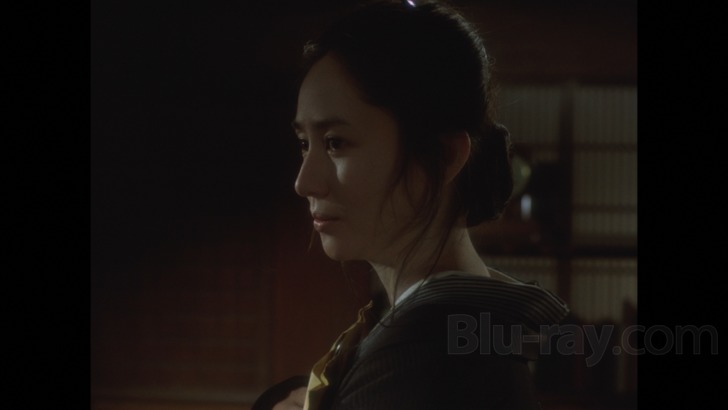
All three of the films in Seijun Suzuki's The Taishō Trilogy are presented on Blu-ray courtesy of Arrow Academy with AVC encoded 1080p transfers. Despite the verbiage reproduced from the insert booklet (below), Zigeunerweisen is in 1:34, Kagero-za is in 1.33:1 and Yumeji is in 1.66:1. While not quite as informative as some Arrow comments about their transfers, the insert booklet for the trilogy contains the following:
The films in The Taishō Trilogy have been restored by Free Stone Productions in Japan using the original film and audio elements. Zeigeunerweisen and Kageroza are presented in their original aspect ratios of 1.37:1. Yumeji is presented in it original aspect ratio of 1.66:1. The films contain their original mono soundtracks.Because all three of these transfer share certain characteristics, I'm going to make some general comments about all of them before moving on to each individual film. While all three boast elements that are either in excellent shape or have been digitally restored to appear so, I personally wished for just a bit more energy in the palette, will all three looking slightly anemic and in some cases skewed toward brown. Grain is very well resolved on all three features and the overall look of the transfers is commendably organic and stable.
While I've rated all three films a 4.0 in video, there's a bit of variability at play, and Zigeunerweisen is probably the least appealing looking of the three, if only by slight degrees. This film has the most generally visible brownish proclivities, and it also suffers from occasional contrast and brightness issues which tend to deplete detail levels (see screenshots 2 and 4, comparing them to the bulk of the rest of the screenshots). The palette is decently healthy looking, but is just slightly drab at times, with some reds verging on rusty browns, though there is (again) variability in even this (note the relatively vivid red lipstick in screenshot 5). Fine detail is generally very good across the board, with elements like fabrics in the often beautiful costumes looking precise and sharp (look at the texture of the uniform in screenshot 19 for a good example).
Zigeunerweisen Blu-ray Movie, Audio Quality 
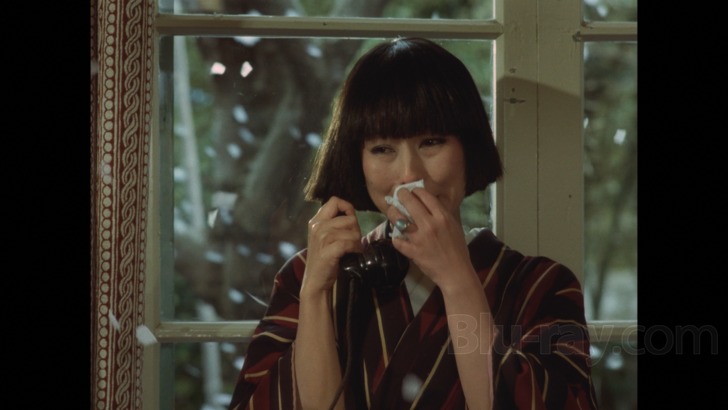
All three films in The Taishō Trilogy sport fine sounding LPCM 2.0 mono tracks in the original Japanese. The films all have rather interesting sound designs, with natural ambient environmental effects merging with sometimes detached feeling dialogue, and with sometimes unusual score choices added into the proceedings as well. All three tracks are unavoidably narrow sounding, but offer fine fidelity and no problems. Occasional "damage" creeps in with regard to things like the archival recording used in Zigeunerweisen.
Zigeunerweisen Blu-ray Movie, Special Features and Extras 
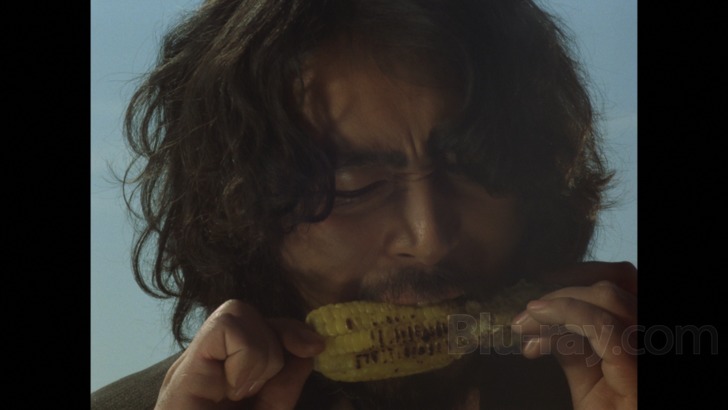
- Introduction by Tony Rayns (1080p; 13:32) is a good overview discussing themes and stylistic approaches.
- Tony Rayns on The Taisho Trilogy (1080p; 10:38) discusses Suzuki's career with and ultimate divorce from Nikkatsu, before moving on to the production of this film and its siblings.
- Theatrical Trailer (1080p; 2:34)
Zigeunerweisen Blu-ray Movie, Overall Score and Recommendation 
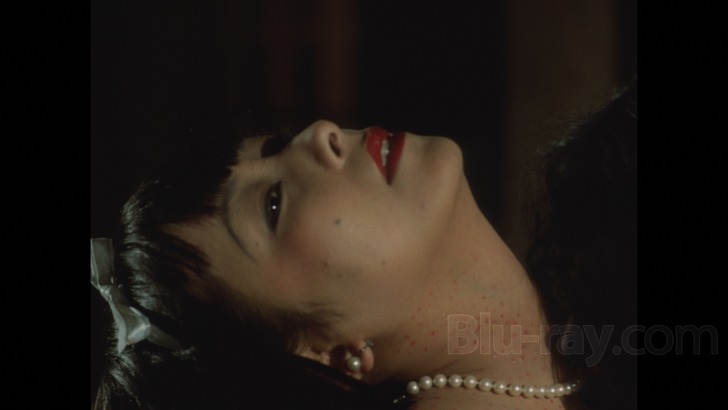
Zigeunerweisen simply needs to be surrendered to on its own terms. This film drifts in and out of various vignettes with no real traditional attachment to rational logic, and it seems to speak directly to the subconscious at times. My advice is to not worry about the narrative and simply go with the flow, enjoying Suzuki's sometimes completely odd visual aesthetic. Recommended.
Similar titles
Similar titles you might also like
(Still not reliable for this title)

Yumeji
1991

Kagero-za
1981

One Missed Call
着信アリ / Chakushin ari
2003

Jigoku
地獄
1960

Black Pit of Dr. M
Misterios de Ultratumba / Indicator Series
1959

Visible Secret
幽靈人間 / Yōu líng rén jiān | Limited Edition
2001

Kill, Baby... Kill!
Operazione paura
1966

Ringu
Ring
1998

One Missed Call 2
着信アリ2 / Chakushin ari 2
2005

Haze
2005

Horrors of Malformed Men
江戸川乱歩全集 恐怖奇形人間 / Edogawa Rampo zenshû: Kyôfu kikei ningen
1969

The Witch's Mirror
El Espejo de la Bruja / Indicator Series
1962

Carved: The Slit-Mouthed Woman
口裂け女 / Kuchisake-onna
2007

Darker Than Night
Blacker Than the Night / Más Negro que la Noche
1975

Noroi: The Curse
ノロイ / Noroi
2005

Centipede Horror
Wú gōng zhòu | Ng gung jau | 蜈蚣咒 | Limited Collector’s Edition Slipcase #1
1982

Demonia
1990

The Vampire Doll
Chi o suu ningyô
1970

Dark Glasses
2022

One Missed Call 3: Final
着信アリFinal / Chakushin ari: Final
2006